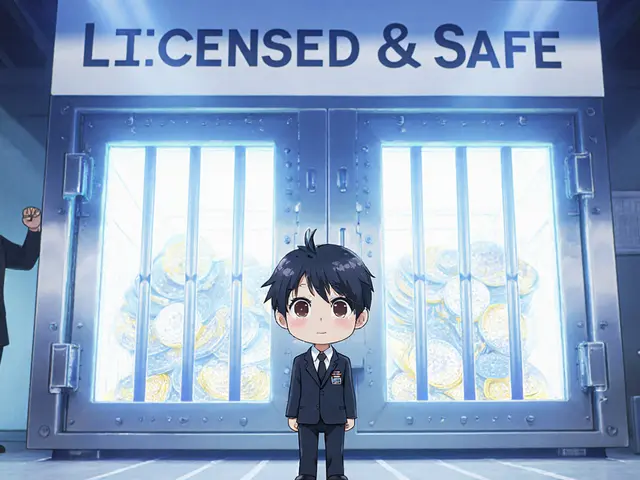Travel Rule Calculator
Check Your Transaction Threshold
South Korea's Travel Rule requires exchanges to share full identity information for transactions over KRW 1 million (approx. $800 USD). This calculator shows if your transaction meets the threshold.
South Korea’s crypto exchanges aren’t just allowed-they’re tightly controlled
South Korea doesn’t ban cryptocurrency. It regulates it. And no one does it with more precision than the Financial Services Commission (FSC). By 2025, the country has turned its once-restrictive stance into one of Asia’s most sophisticated crypto frameworks. If you’re trading, investing, or running an exchange here, you’re not operating in the wild west-you’re in a lab with security cameras, bank-grade locks, and government auditors watching every move.
Real-name accounts: No anonymity, no exceptions
Every crypto exchange in South Korea must link your trading account to a real-name bank account. That means you can’t just deposit Bitcoin from an anonymous wallet. You need to verify your identity with a Korean bank-like Shinhan, KB, or Hana-and use that same bank’s account to fund your exchange. This rule, introduced in 2020, isn’t optional. It’s baked into the license. If an exchange lets someone trade without a verified bank link, it loses its license. Period.
This isn’t just about tracking money. It’s about cutting off money laundering at the source. The FSC requires exchanges to match every deposit and withdrawal to a real person with a Korean ID number. Even if you’re a foreigner, you still need to go through the same process through a Korean partner bank. There’s no workaround. No offshore accounts. No privacy coins bypassing the system.
Security isn’t a feature-it’s a requirement
Before any exchange can operate, it must pass a security audit from the Korea Internet & Security Agency (KISA). That means meeting the ISMS (Information Security Management System) standard, which is the same level of security demanded from banks and government systems. Exchanges must encrypt all data, log every login, monitor for breaches in real time, and conduct quarterly penetration tests.
In 2024, KISA shut down two smaller exchanges for failing to meet these standards. One had stored private keys on a server connected to the internet. Another didn’t log admin access. Both were banned immediately. There’s no second chance. The FSC doesn’t negotiate on security.
The Travel Rule: KRW 1 million is the line
South Korea enforces the FATF Travel Rule stricter than most countries. If you send or receive more than KRW 1 million (about $800 USD) in crypto, the exchange must share the sender’s and receiver’s full names, ID numbers, and account details with each other. This applies to all transfers-whether it’s Bitcoin to Ethereum, or fiat to crypto.
Unlike the U.S., where the rule is still being debated, South Korea made it mandatory in 2021. All four major exchanges-Bithumb, Upbit, Coinone, and Korbit-comply automatically. Even if you’re trading with someone overseas, if the transaction crosses the KRW 1 million threshold, the exchange must report both sides. There’s no opt-out. No anonymity layer. Just full transparency.

ICO is still banned-but token issuance might change
Since 2017, South Korea has banned Initial Coin Offerings (ICOs). No company can raise money by selling new tokens to the public. The FSC saw too many scams and decided to shut it down completely.
But in 2025, that’s starting to shift. The FSC is drafting rules for Security Token Offerings (STOs), where tokens represent real ownership-like shares in a company or real estate. These won’t be wild crypto launches. They’ll be regulated like stocks. The Busan Digital Asset Nexus is already testing STO pilots with foreign institutional investors. If this works, we could see legal token sales by mid-2026.
Crypto ETFs are coming-finally
One of the biggest shifts in 2025 is the FSC’s plan to launch spot cryptocurrency ETFs on the Korea Exchange. These won’t be futures-based like in the U.S. They’ll hold actual Bitcoin and Ethereum, tracked by a diversified index. Think of it like an S&P 500 fund, but for crypto.
Pension funds, mutual funds, and even retail investors through brokerage apps will be able to buy these ETFs starting late 2025. The sponsor must meet strict rules: real-time NAV reporting, full audit trails, and no leverage. The FSC wants to make crypto investing as safe and predictable as buying a stock.
This isn’t just for big money. It’s a signal that crypto is becoming part of Korea’s mainstream financial system. The same banks that handle your salary now might soon handle your Bitcoin exposure.
Corporations can finally hold crypto-sort of
Since 2017, Korean companies couldn’t hold Bitcoin or any crypto on their balance sheets. The FSC feared volatility and fraud. But in early 2025, the Virtual Asset Task Force proposed a change.
Now, corporations can open KYC-verified accounts at licensed exchanges and hold crypto-up to 5% of their total assets. They must report holdings monthly and can’t use it for payments or speculation. Think of it like holding gold bars in a vault. It’s for treasury diversification, not trading.
Companies like Samsung SDS and Hyundai’s tech arm are already testing this. If it works, we could see Korean firms using crypto as a hedge against currency risk-especially for global supply chains.

Taxes? Not yet. But they’re coming
Right now, you don’t pay capital gains tax on crypto profits in South Korea. The government postponed its 2025 tax plan. That’s not because they’re soft on crypto. It’s because they’re still designing the system.
When taxes return, they’ll likely follow this model: profits offset by losses in the same year. If you made 10 million KRW in Bitcoin and lost 4 million in Ethereum, you only pay tax on the net 6 million. There will be no tax on holding. Only on selling. And NFTs? Only taxed if they’re used for payments or investment. A digital art piece you collect? Probably not taxed.
Regional hubs: Busan, Jeju, Incheon
Seoul isn’t the only player. Busan is building the Digital Asset Nexus-a special zone for STOs and foreign institutional crypto investment. Jeju Island is testing blockchain-based identity systems. Incheon is looking at crypto payment gateways for international trade.
This isn’t just local innovation. It’s a national strategy. South Korea wants to be the financial gateway for Asia’s digital assets. But every project, no matter how bold, must pass FSC oversight. No free zones. No loopholes. Just regulated growth.
Why this matters globally
South Korea’s model is being watched by Japan, Singapore, and even the EU. It proves you can have strict rules and still grow a thriving crypto market. The FSC didn’t try to stop innovation. It built a cage around it-one that keeps out fraudsters but lets legitimate players thrive.
By 2026, South Korea could be the first Asian country to have institutional-grade crypto ETFs, corporate crypto holdings, and legal token issuance-all under one unified law. The Virtual Asset Basic Law, expected to pass in September 2025, will codify all this. It’s not just regulation. It’s infrastructure.
What’s next?
If you’re an investor: watch for the ETF launch. If you’re a trader: know that anonymity is gone. If you’re a business: prepare for corporate crypto limits. If you’re building something: don’t try to bypass the system. The FSC has already seen it all-and shut it down before.
South Korea isn’t anti-crypto. It’s pro-responsibility. And in 2025, that’s the most valuable thing in crypto.
Is crypto legal in South Korea?
Yes, crypto is fully legal in South Korea-but only when traded on FSC-licensed exchanges. You can buy, sell, and hold Bitcoin, Ethereum, and other assets, but only through regulated platforms like Upbit or Bithumb. Unlicensed exchanges are illegal, and using them can lead to account freezes or fines.
Can I use Binance or Coinbase in South Korea?
No. Binance, Coinbase, and other foreign exchanges are not licensed by the FSC. Korean residents are required to use only domestic exchanges that comply with real-name banking, ISMS security, and the Travel Rule. While some users still access foreign platforms, doing so violates local law and exposes you to risks like frozen funds or no legal recourse if hacked.
Do I have to pay taxes on crypto gains in South Korea in 2025?
No, not yet. The government postponed its planned 2025 crypto capital gains tax. Currently, profits from trading are not taxed. However, the FSC is finalizing a tax system expected to launch in 2026. When it does, gains will be taxed as income, with losses able to offset gains in the same year. Holding crypto without selling remains tax-free.
Can Korean companies own Bitcoin?
Yes, but with limits. Starting in 2025, corporations can hold crypto up to 5% of their total assets through KYC-verified accounts on licensed exchanges. They cannot use it for payments, speculation, or lending. The goal is treasury diversification, not trading. All holdings must be reported monthly to regulators.
What’s the difference between NFTs and crypto in South Korea’s rules?
It depends on function. If an NFT is used as an investment (like a share in a digital asset), it’s treated like crypto and falls under FSC rules. If it’s purely collectible-like a digital art piece or game item with no resale value or financial rights-it’s not regulated. The FSC looks at intent and use, not just the technology.
Are crypto ETFs available in South Korea yet?
Not yet, but they’re coming. The FSC approved the framework in early 2025, and spot crypto ETFs based on diversified indices are expected to begin trading on the Korea Exchange in late 2025 or early 2026. These will be accessible through licensed brokers and will hold actual cryptocurrency, not futures.
Why does South Korea require real-name bank accounts for crypto?
To prevent money laundering and fraud. Before 2020, crypto exchanges were used to move illicit funds through anonymous deposits. The FSC required all exchanges to link trading accounts to real-name bank accounts so every transaction can be traced back to a verified individual. This cut off the use of crypto for illegal activity and restored public trust in the market.
What happens if an exchange fails KISA security certification?
It’s shut down immediately. KISA conducts unannounced audits. If an exchange fails-whether due to weak encryption, unsecured private keys, or lack of access logs-it loses its license and must cease operations. Users’ funds are frozen until a compliant buyer takes over or assets are returned under court supervision. No warnings. No grace period.







Louise Watson
November 9, 2025 AT 02:37And somehow, that’s the most honest version of it.
Benjamin Jackson
November 9, 2025 AT 21:02Not because it’s perfect, but because it refuses to pretend crypto is wild and free when it’s really just money with a new name.
People keep screaming about freedom, but what they really want is safety without accountability.
Korea gave them accountability-and kept the innovation alive.
That’s not control. That’s maturity.
Liam Workman
November 10, 2025 AT 06:24Real-name accounts? Check.
Security audits like a bank? Check.
Travel Rule? Already done.
ETFs coming? Yes please.
It’s like they took the chaos of crypto and gave it a bedtime routine.
And somehow… it’s working.
Who knew structure could be sexy?
Jeana Albert
November 11, 2025 AT 13:44Natalie Nanee
November 13, 2025 AT 09:02Angie McRoberts
November 13, 2025 AT 18:47And people are calling this innovation?
I mean… it’s safe. I guess.
But where’s the fun?
Chris Hollis
November 15, 2025 AT 11:01This isn’t special. It’s basic.
Diana Smarandache
November 16, 2025 AT 11:36Allison Doumith
November 17, 2025 AT 11:47Meanwhile the US lets hedge funds pump coins into retail wallets then disappear with the profits
And nobody says a word
It’s not about control
It’s about who gets to profit from the chaos
Scot Henry
November 18, 2025 AT 11:38Also, ETFs are coming? That’s huge. Finally.
Sunidhi Arakere
November 19, 2025 AT 15:12Vivian Efthimiopoulou
November 20, 2025 AT 10:11By mandating ISMS compliance, enforcing the Travel Rule with surgical precision, and preparing for institutional-grade spot ETFs, they are constructing a regulatory scaffold that does not suppress innovation but channels it into sustainable, transparent, and accountable forms.
This is not overreach.
This is civilization.
Other nations watch. Some scoff. A few are beginning to emulate.
But only Korea had the courage to build the cage-and then invite the lions inside.
Angie Martin-Schwarze
November 22, 2025 AT 03:44also why is everyone so calm about this? its like they just accepted being watched all the time...
Fred Kärblane
November 22, 2025 AT 21:19Real-name KYC? Check.
ISMS-certified infrastructure? Check.
Travel Rule enforcement? Check.
Corporate crypto exposure capped at 5%? That’s the sweet spot-enough for diversification, not enough for reckless speculation.
And spot ETFs? That’s the kill shot for retail FOMO.
They didn’t just regulate crypto.
They engineered its transition from fringe asset to core portfolio component.
Respect.
Janna Preston
November 22, 2025 AT 23:16Meagan Wristen
November 24, 2025 AT 14:42It’s rare to see a government prioritize safety without crushing innovation.
Maybe we’re finally moving past the ‘crypto or bust’ mentality.
Good job, Korea.
Becca Robins
November 24, 2025 AT 17:59Also, I’m lowkey excited for the ETFs. I just want to buy crypto without downloading 7 apps and losing my keys 😅
Alexa Huffman
November 25, 2025 AT 00:48Finn McGinty
November 25, 2025 AT 17:12